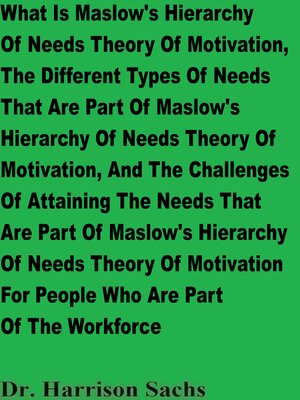What Is Maslow's Hierarchy of Needs Theory of Motivation, the Different Types of Needs That Are Part of Maslow's Hierarchy of Needs Theory of Motivation, and the Challenges of...
audiobook (Unabridged)
By Dr. Harrison Sachs

Sign up to save your library
With an OverDrive account, you can save your favorite libraries for at-a-glance information about availability. Find out more about OverDrive accounts.
Find this title in Libby, the library reading app by OverDrive.



Search for a digital library with this title
Title found at these libraries:
| Library Name | Distance |
|---|---|
| Loading... |
This audiobook is narrated by a digital voice.
This essay sheds light on what is "Maslow's hierarchy of needs theory of motivation", demystifies the different types of needs that are part of "Maslow's hierarchy of needs theory of motivation", and expounds upon the challenges of attaining the needs that are part of "Maslow's hierarchy of needs theory of motivation" for people who are part of the workforce. Succinctly stated, "Maslow's hierarchy of needs theory of motivation" is a motivational theory that posits that people are motivated by their aim to fulfill various tiers of needs. Furthermore, "Maslow's hierarchy of needs theory of motivation" also tacitly postulates that the various specific tiers of needs that people aim to fulfill are based on the various tiers of needs that are unfilled in their lives. One of the presuppositions of "Maslow's hierarchy of needs theory of motivation" is that five tiers of needs can be arranged in a five-stage model in which the tier of physiological needs that is relegated to the bottom of this five-stage model takes precedence over the other four tier of needs as being the utmost pivotal tier of needs to fulfill based on "Maslow's hierarchy of needs theory of motivation". Another presupposition of "Maslow's hierarchy of needs theory of motivation" is that it can be eminently cumbersome to motivate a person who has fulfilled all of the tiers of needs that are part of "Maslow's hierarchy of needs theory of motivation". If a person feels as though he has fulfilled his "physiological needs, safety needs, love and belonging needs, esteem needs, and self-actualization needs", and feels as though he has reached his latent potential, he then may be deterred to work a real private sector job based on voluntary demand. A person may feel as though the incentivize to work a real private sector job based on voluntary demand is not enticing enough for him to be pursuant of a real private sector job based on voluntary demand.







